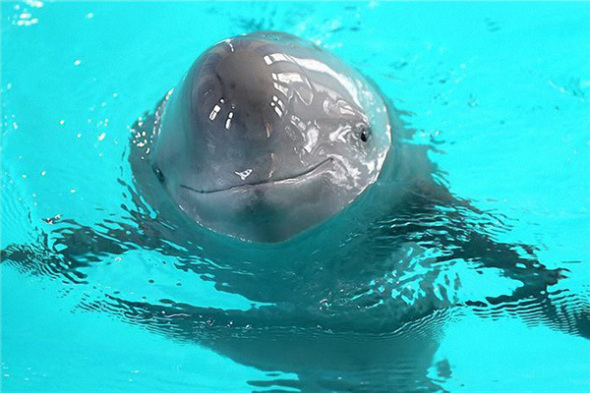
A captive finless porpoise swims in an aquarium in the Chinese Academy of Sciences' Institute of Hydrobiology in Wuhan, Hubei province, last year. (Photo/Xinhua)
In 2016, the ministry published The Plan for Saving the Finless Porpoise (2016-25), which focuses on both on-and off-site protection efforts and genetic conservation, and stresses the importance of the assistance of social organizations, such as charities.
In June, the National Aquatic Wildlife Conservation Association launched the Save the Yangtze Finless Porpoise Alliance in Wuhan, which includes more than 60 member organizations nationwide.
"The founding of the alliance was a milestone in the engagement of social organizations in the conservation of this precious species," said the alliance's chairman Li Yanliang, who is also head of the Yangtze Fishery Administration Office.
The alliance encourages ex-fishermen to become "porpoise guardians" and help fishery administrators crack down on illegal fishing and sand excavation.
"Protection work isn't limited to the government or charities; it's everyone's mission," said Zhang, of the SEE Foundation.
Resources
Last year, the foundation's centers in Hunan and Anhui launched a project called Save the Smiling Angel of the Yangtze River, which is operated by the Changjiang Conservation Foundation in Hubei.
"Porpoise conservation is not easy work," Zhang said.
"As our foundation is an association of businesspeople, we have a large number of social resources and are more capable of channeling our resources into conservation work."
The foundation's annual fundraising day on Sept 9 netted 13 million yuan ($2 million), far outstripping the 3 million yuan it raised last year.
Meanwhile, in June, four pioneer protection sites were established at Poyang Lake and Yueyang in Hunan, plus Anqing and Hewangmiao.
The sites were a joint effort by the Ministry of Agriculture, the National Aquatic Wildlife Conservation Association, the World Wide Fund for Nature and the Save the Yangtze Finless Porpoise Alliance.
In July, 40 porpoise guardians - including 30 former fishermen - were recruited at the four sites to patrol 719 square kilometers of water and protect 380 porpoises. Next year, a further 1,000 guardians will be recruited.
"They are of great help in our work," said Li Feng, deputy director of the Yueyang Fishery Administration. "Most of them used to be fishermen, so they know all about the water and fishing activities. That helps to prevent illegal fishing."
Yang Tianxi, a 49-year-old ex-fisherman, became a guardian in July, following a tough selection procedure that lasted two months.
"I earn 3,000 yuan per month, much less than I earned before. But I love the job because I can see and protect the porpoises every day; they are like old friends. Friends should protect each other," he said.


















































